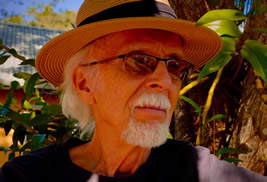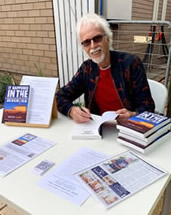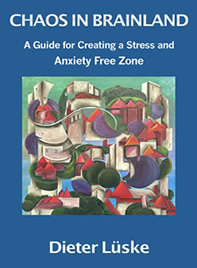Gem Hunting - Rubyvale - Seventies
It Happened in the Seventies - Memoir
Book by Dieter Luske - Writer - Author
Author of fiction & non-fiction - suspense - crime & mind matters
Book snippet from:
It Happened in the Seventies - Sea Change Story
An intriguing story of risk-taking, self-discovery and profound change.
Arriving in Rubyvale - The Seventies - Book Snippet
It Happened in the Seventies - Book by Dieter Luske
Gem Hunting Fever
(Scroll down for pictures)
Rubyvale was a tiny village, looking like a western gold rush town on the American frontier. There were only a handful of buildings, and I expected Wyatt Earp to step out of the post office. Across the junction was a pub. Was that the pub from the song, “A Pub with No Beer”? On the opposite side was a caravan park, with what looked like an old locomotive steam engine next to the toilet and shower block.
Off to the left stood a row of houses, occupied mainly by gem cutters. Near the post office were huts used by Thai sapphire dealers as offices.
We parked outside the post office. In a village this size, the postmaster knows everything; in this one, the postmaster was a postmistress, and she did. First, we had our mail redirected to Rubyvale; we planned on staying for two weeks. Having completed the postal business, she gave us the vital village information. We could shower at the village campground for 30 cents a time. If we wanted meat, we had to order it from the shop; delivery was on Wednesdays and Saturdays. If we found sapphires, we could sell them to the Thai dealers. The only English phrase they knew was ‘Dig more, dig deeper, more digging,’ and they were keen to buy up everything, even tiny or cracked sapphires.
Finally, she gave us a hot tip: drive 3 km out of Rubyvale before setting up camp. On no account should we stake our claim too close to someone else’s. Shouting distance would be reasonable. That way, we could call hello to see if they are friendly or hostile.
As we thanked her and left the post office, a mean-looking bloke dismounted his motorbike; we noticed a holster with a gun sticking out from behind his saddlebags. This wasn’t Wyatt Earp, but we couldn’t help feeling that Earp’s services might soon be required from the look of him.
A few kilometres out of town, we found what looked like a suitable spot to camp. Another car drew up and the driver called, “Can I help you?”
"Thanks, we are fine; we’re looking for a nice spot to camp."
"Like to come to my camp for a cup of tea? Follow me."
A couple of minutes later, we arrived at his camp, a permanent setup. It consisted of a big caravan with annexes, huts and sheds. Heavy machinery and equipment completed the picture, and we could hear a generator humming. He introduced himself as Ryan, and his wife as Kath. A German Shepherd and two cats followed her; they also wanted to be introduced.
We sat down, the cats snuggling up on our laps. Kath made tea and we talked our heads off. They were from New Zealand and had been in Rubyvale for a couple of years, along with Ryan’s two brothers.
They weren’t amateur fossickers but into serious digging. They had a massive truck with drilling equipment to bore mining shafts about 60 cm wide. After reaching what they called a wash, they would dig with jackhammers and shovel the dirt into buckets, which automatically went up the shaft high above the ground and down again into an arrangement of drums for washing, sorting and sieving. At the end of the day, they checked their catchment container for any ‘colour,’ sapphires or other gems. Not as romantic as we envisaged, but still exciting.
Ryan showed us some beautiful cut sapphires and tins full of smaller rough gems. We talked about where to find stones and established our little claim site. Ryan lent us a 44-gallon drum cut in half so we would have a container to wash the dirt in. The sieve we’d bought fitted perfectly into the drum. For good measure, he gave us a shovel and a pick.
It was getting late, and we were keen to dig for at least one hour. Driving back, we spotted an ideal campsite and parked between three trees in the perfect position to tie our tarp to. We took our chairs out, made a cup of tea, and relaxed. It felt right; it was a nice campsite. The carpet from Gabrielle and Henry came in handy and made the camp look neat. We set up a proper campfire using rocks and our barbeque plate.
It was 4 pm before we picked a spot to dig. Not as easy as we thought. The top 20 cm was easy digging, but it became more challenging after that. One hour later, we were pretty much buggered. We hadn’t done much physical work for a while. Looking back at the fruit of our labour, we had nothing. So far, we hadn’t found anything resembling a gemstone.
Ryan had told us about a trick to check if a stone was a gem. We should take the stone into our mouth, and if it stays cold, it is a gemstone. Every few minutes, we tasted little stones, but all became warm. All we had to show for was a mouth full of sand and gravel.
Almost on dinnertime, people from the next campsite called out to us, “Any colour?” Colour, as we knew from Ryan, referred to sapphires.
“No,” we called back, “nothing yet.”
....... to continue >> buy at Amazon
.. return to the Snippet Menu
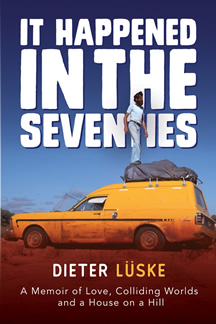 It Happened in the Seventies
It Happened in the Seventies
A Memoir of Love, Colliding Worlds and a House on a Hill
An intriguing story of personal risk-taking, self-discovery and profound change.
...available as e-book - paperback & hard cover
Dieter Luske -> Author Profile
Published by LU-Books
An inspiring read of a life-changing escapade Down Under
Phil Brown – Arts Editor
Rubyvale - The Seventies - Photos:
NOTE: Images are NOT included in the book...
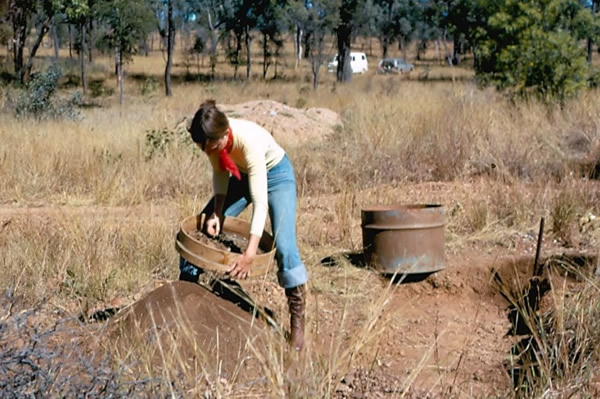
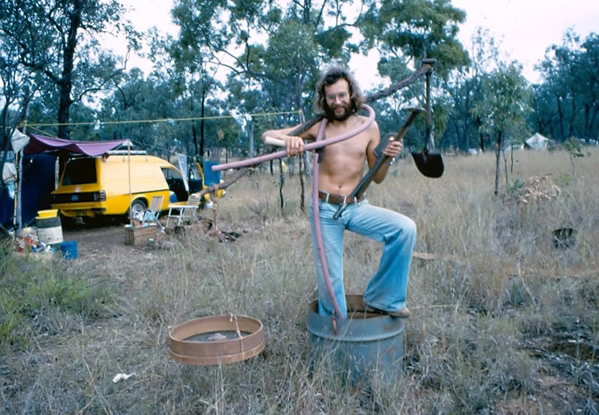
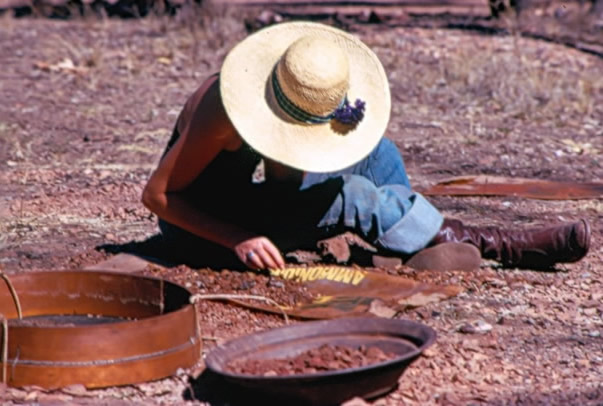
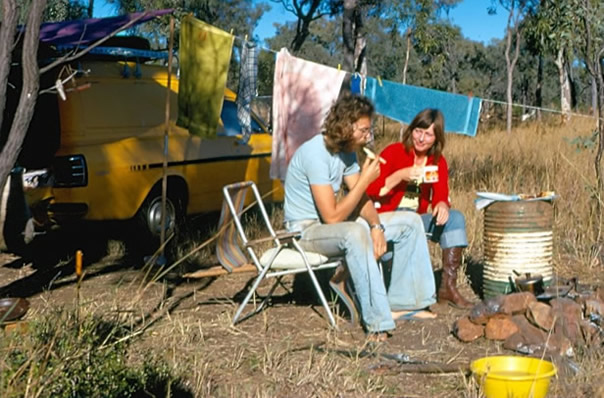
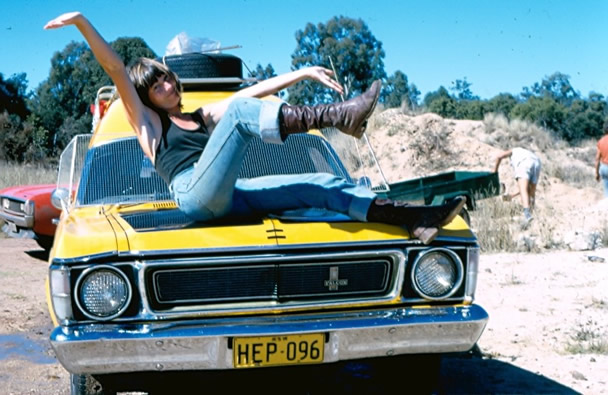
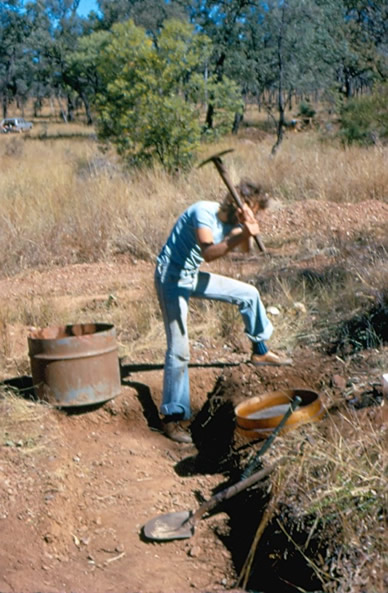
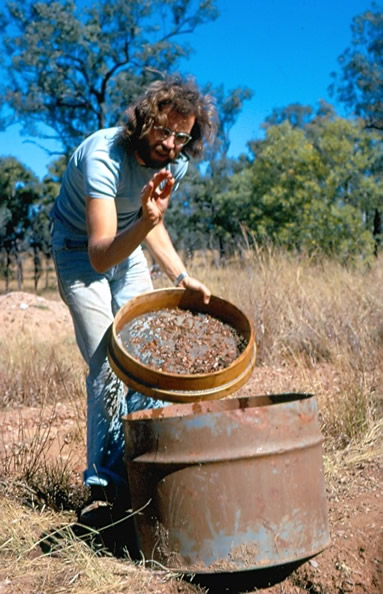
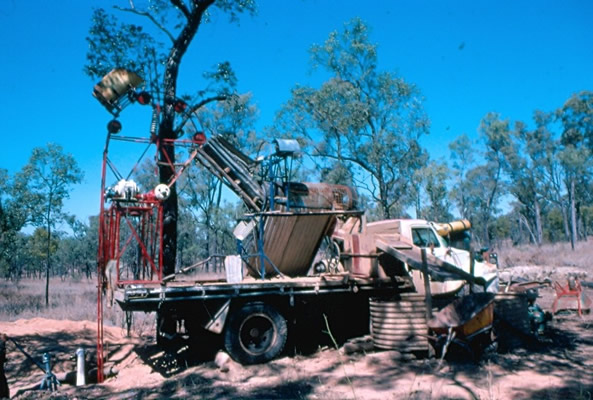
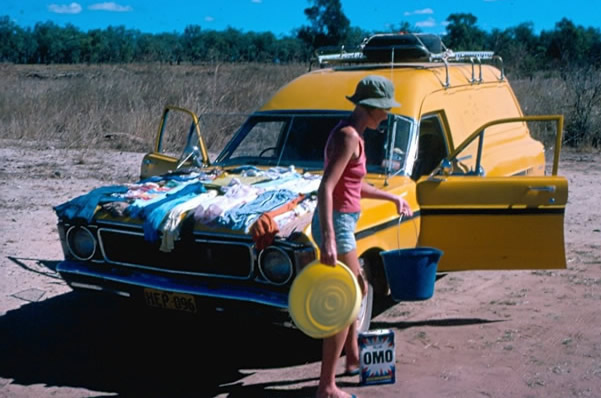
More high quality photos - "It happened in the seventies"
KEEP IN TOUCH!
Join Dieter's Newsletter
Dieter Luske - Writer
Book Description
It Happened in the
Seventies
From the author of ‘Do You Believe in You’ comes an intriguing story of personal risk-taking, self-discovery and profound change.
At only twenty-one, Dieter started his own thriving business and lived the good life in Hamburg, Germany. By the age of twenty-four, he knew something was missing: there must be more to life than earning a living, and he wanted to find it in Australia as a quest for all things vital, health, love, creativity, meaning, purpose and independence.
How does life continue if one decides to leave all one has achieved?
Dieter met Giselle on Christmas Day 1973. They didn’t want a relationship but the universe had other ideas! Arriving in Sydney in 1974, they lived, worked and explored Australia in their yellow panel van for two and a half years, discovering themselves and their unpredictable future.
Driving from one adventure to another, they faced unexpected dangers and found paradise in unforeseen places.
Devastating news arrived from Hamburg – their dreams and reality collided.
Could they still achieve their goals and live their dream lifestyle?
--- --- ---
An inspiring read of a life-changing escapade Down Under
Phil Brown - Arts Editor
The Courier-Mail
The Bookshelf
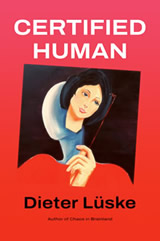
Certified Human
Sci-Fi Crime Novel
Anxiety Free Zone
Overcome
